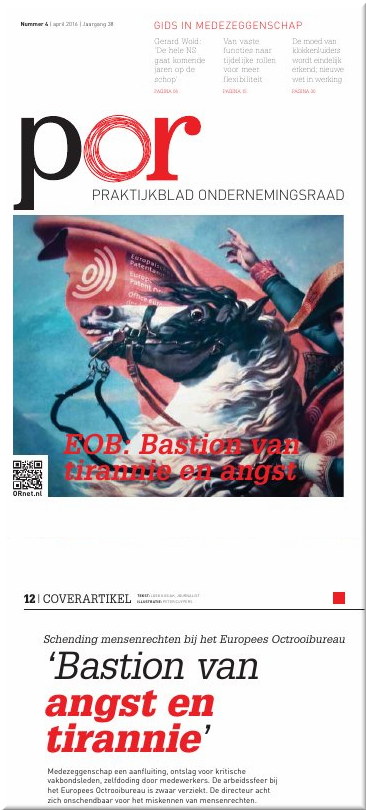Violaciónes a los Derechos Humanos por la Oficina Europea de Patentes
‘Bastión del Temor y Tiranía’
La participación de los trabajadores es una burla, sindicalistas críticos son redundantes, ocurren múltiples suicidios.
El ambiente en la Oficina Europea de Patentes está severamente envenenado.
El director considera a sí mismo por encima de los derechos humanos.
“Los empleados de la Oficina Europea de Patentes trabajan en un bastión de la tiranía y el miedo”, dice una fuente anónima de la representación del personal (PVT) del establecimiento Rijswijk (2.700 empleados) de la Oficina Europea de Patentes (EPO).
La organización, también con oficinas en Berlín, Munich y Viena, es responsable de proteger los derechos de los inventores de la Unión Europea.
Nuestra fuente prefirió quedar anónima. “Porque,”, subraya, “hablar con el mundo exterior acerca de asuntos internos le podría costar su trabajo. El CEO Benoît Battistelli espera lealtad absoluta.‘
“¿Tenemos voz? No me hagas reír. La representación del personal sólo es consultado para decir sí o no a un documento. La gerencia no aprecia opiniones informadas o propuestas alternativas de la PVT. ‘
‘La dirección también decide si podemos cumplir con nuestros miembros. Por eso, tenemos que aplicar tres días de anticipación y tener a la mano una lista de temas ‘.
‘Por otra parte, el envío de un correo electrónico a todos los empleados está prohibido. Al enviar a más de cincuenta direcciones de correo electrónico del sistema bloquea automáticamente el mensaje.’
“Abiertamente empleados no son apreciados y personas no son tratadas como seres humanos. Algo que afectó a todos los empleados durante este tiempo fue cuando un colega saltó desde el séptimo piso en Rijswijk durante 2013.”
Ese no es el único suicidio, otro miembro de la rama Rijswijk acabó con su vida en el último día de sus vacaciones. Por otra parte, el sindicato Suepo alarmó a la EPO a mediados de 2015 con respecto a los suicidios de tres empleados de la sede central en Munich.
Eso hace un total de cinco casos de suicidio en tres años, según el sindicato, debido a las venenosas condiciones de trabajo.
Rey Sol
[Debido a la inmunidad legal de la EPO, Battistelli se comporta como un "Rey Sol con un tribunal propio ']
Como organización intergubernamental, formada por 38 estados miembros supervisional, la EPO goza de inmunidad legal. Debido a esta inmunidad legal, puede pasar por alto gran medida las legislaciónes nacionales y las leyes de la EU en los países donde se encuentran las oficinas de EPO.
Precisamente ahí radica, según la opinión predominante entre los empleados, en gran parte la causa del “reino del terror” de los franceses CEO Battistelli: ‘Él puede simplemente continuar su comportamiento como “Rey Sol con un tribunal propio.”‘
En 2015, el tribunal de La Haya dictaminó que la EPO viola los derechos humanos en un caso que el abogado Liesbeth Zegveld, especializado en derechos humanos, presentada en nombre de SUEPO. El tribunal dictaminó que el impedimento de la unión en su trabajo pesa más que su inmunidad legal.
“El hecho que la EPO ha apelado contra esta sentencia, ‘Zegveld dice,’ ilustra una vez más la arrogancia de la organización.”
“Se considera a sí mismo por encima de la ley y procede a abusar de su inmunidad legal. No he tenido previamente un caso con un oponente tan agresivo.‘
Desde la sentencia de La Haya, Zegveld observa una postura más dura de Battistelli contra los directores de SUEPO, que a menudo son también activos empleados de EPO. Dos de ellos se les ha obligado a que renuncien. Entre ellos, el presidente de la unión holandesa Elizabeth Hardon, cuya pensión se ha reducido en un 20 por ciento, y el tesorero de la asociación.
Hardon se encuéntra a sí misma ser objeto de una investigación interna, que es abiertamente en contra de las reglas de la EPO. Otros cinco miembros activos del sindicato, de los cuales tres en Rijswijk, se han suspendido en espera de una próxima investigación. Uno de ellos también se le ha rebajado ocho grados de sueldo.
Cacería De Brujas
Zegveld: ‘Esta es una caza de brujas para silenciar la unión y sus críticos empleados. Están dirigidas sobre trivialidades dudosas probable es que no lo suficientemente graves como para que alguien despedido o se reduca su pensión.“
Battistelli se defendió en el Financieele Dagblad en el que afirmó que hay una “campaña orquestada ‘para desestabilizar la organización.
‘Esa unión y del personal representantes investigados es “pura coincidencia.”‘
Aparte de la destitución de dirigentes sindicales Zegveld está preparando una demanda contra la EPO por acoso.
“Como funcionario y empleado de la unión de laEPO, de acuerdo con las directrices del Battistelli, no se puede decir a sus propios miembros que están siendo investigados. Si bien es la tarea de la unión sea una voz crítica y para informar a los miembros.”
“Si hay una investigación en tu contra,” de acuerdo a nuestra fuente anónima en el PVT, ‘usted no puede informar a un colega. Así que usted se limita a: “yo estaba lejos y no te puedo decir por qué”. Luego, su colega sabe lo suficiente. Que, mientras que el director tiene el derecho de revelar a los medios que hay que ejecutan las investigaciones contra los sindicalistas.”
Los sujetos investigados por la comisión de investigación disciplinaria tienen derecho a la asistencia de un miembro de la PVT.
‘Durante la audiencia, los empleados se enfrentan a menudo con actos que no tenían nada que ver con. Su culpabilidad es ya una conclusión inevitable. “Prácticas de la Stasi”, de acuerdo a los colegas de Europa del Este que trabajan en la EPO.’
Mayor Carga De Trabajo
“El personal de la EPO, ‘continúan su membresía sindical en el anonimato,” son gente de alto nivel que se sienten frustrados de que no puedan decidir las condiciones de trabajo.’
‘Los ejecutivos EPO quiere promover una mayor competencia entre los empleados. Se han puesto en marcha un nuevo sistema de retribución. Su supervisor determina ahora lo que aumentan el sueldo obtendrá; También puede cambiar unilateralmente tus condiciones de empleo.”
‘Mientras tanto su supervisor a menudo te sobrecarga con montañas de trabajo. La carga de trabajo en algunas unidades se ha incrementado en un 30 por ciento. Por supuesto, ahora muchos van a la jubilación anticipada, o llaman enfermos. Los que llaman enfermos, y/o tomar una caminata o un paseo en bicicleta están en violación y en riesgo de medidas disciplinarias.”
“El departamento de recursos humanos, que supuestamente debería asegurar la reinserción, es en sí misma falta de personal y exceso de trabajo. Las medidas preventivas contra el absentismo son modestas en comparación con las sanciones represivas impuestas.’
“Las condiciones de trabajo son un tema difícil de abordar. El PVT intenta, pero la respuesta estándar es frecuente que un tema tan debe ser discutido “en un contexto diferente,” a nivel central. Entonces no se oye nada más en eso. “
Una propuesta de la PVT para una evaluación del riesgo personal fue enterrado por la EPO. La inspección del trabajo holandesa no se le permite entrar en el edificio debido a la inmunidad legal de la EPO.
‘El PVT también pidió una investigación sobre una conexión entre el ambiente de trabajo y suicidios. Pero la gestión no ha respondido a esta.’
Battistelli respondió en una entrevista con la NRC Handelsblad, y describe los suicidios como “tragedias personales no evidencia una relación con la agencia y/o sus métodos.”
La inspección del trabajo dice que sabe de las quejas a través de los medios de comunicación y otras fuentes. “Pero nos faltan los poderes para actuar”, según un portavoz.
“No podemos entrar en la EPO como que no pueden entrar en una embajada. Le damos ningún juicio sobre posibles irregularidades. Después de todo, no podemos investigar ‘.
De hecho, ninguna investigación ocurrió acerca de cómo un empleado en el territorio holandés optó por saltar de una trampa mortal desde el séptimo piso durante horas de trabajo.
Protesta
Sin embargo, los examinadores de patentes pueden organizar manifestaciones en territorio holandés. Y al final de enero en Rijswijk, masivamente decidiéron hacerlo en protesta por el despido de dos colegas a causa de sus actividades sindicales y para restaurar un tercer empleado a su posición anterior.
Miembro del Parlamento John Kerstens caminaba entre los manifestantes y presentó una moción en la que pedía el gabinete “para garantizar las condiciones normales de trabajo y el respeto de los derechos humanos de los trabajadores.” Secretario de Estado Martijn van Dam anunció entonces una “investigación independiente” en las condiciones de trabajo en la EPO.
“El gobierno se ha mantenido notablemente larga distante con respecto a la oficina de patentes, ‘señala Liesbeth Zegveld. ‘Pero es el responsable de que en su territorio se respeten los derechos humanos. El Estado holandés puede, si no se toman medidas, esperar una acusación por parte de la SUEPO’
“Por otro lado, también me di cuenta de que el gabinete está cada vez más impaciente con las continuas violaciónes de los derechos humanos por parte de la EPO, tales como el derecho a la negociación colectiva, derecho de reunión y el derecho a la libertad de expresión.”
“Por supuesto, esto aparte del hecho de que los derechos individuales como el trabajo y las pensiones se vean perjudicados y los trabajadores están al parecer están siendo conducidos al suicidio.“
El Presidente Danés Jesper Kongstad del Consejo de Administración de la organización de patentes ha pedido a los 38 países participantes investigar las acciones disciplinarias por parte de la EPO por una comisión independiente.
La representación del personal se mantiene activa por su parte, en espera de tiempos mejores.
“Toda la situación debería normalizarse de forma natural, como en todo país democrático. El PVT podría, por supuesto, cerrarse a sí mismo debido a la falta de participación actual. Pero entonces se pierde inmediatamente por completo la comunicación con, y las votaciones de los aficionados.
‘Ahora el PVT todavía puede recopilar archivos y ayudar a los empleados. El PVT también puede publicar de forma discreta en la intranet; si hace clic en cinco, seis veces encontrará sus páginas. ‘
“Hay muchas cosas que el PVT hace también son tareas del departamento de recursos humanos. Pero ven el personal y sus representantes, como el enemigo. Sin duda ya que el jefe del departamento es un amigo personal de Battistelli.’























 Content is available under CC-BY-SA
Content is available under CC-BY-SA